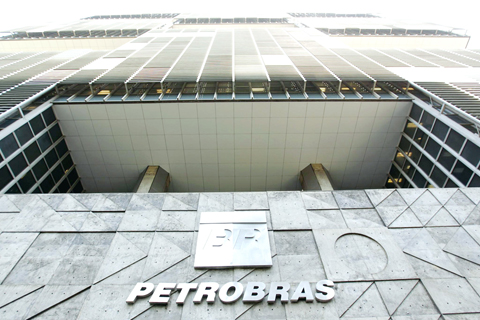Brazil’s Petrobras unveiled one of the world’s biggest share offerings on Friday, a sale of up to US$64 billion in new stock to finance oil exploration aimed at turning Brazil into a leading oil exporter of the 21st century.
The transaction could be expanded to US$74 billion if there was heavy demand, the state-run company said.
The cash serves as the core of an ambitious plan Petrobras has already outlined to boost capital expenditure over the next five years to US$224 billion as it seeks to tap potentially vast oil reserves discovered recently off the coast of Rio de Janeiro.

PHOTO: EPA
The US$64 billion dollar target for the new share offer represents a more than 40 percent increase in the company’s capital, which on Thursday was estimated at US$150 billion.
Petrobras’s share prices rose nearly 5 percent during trading in Sao Paulo after the announcement, confirming investor confidence in the issuance and Brazil’s outlook generally.
Analysts’ predictions that the market could balk at the high price Petrobras has agreed to pay the government for new reserves in an oil-for-shares transaction seemed confounded, at least initially.
The offer would see 2.1 million common shares and 1.5 million preferred shares issued, the company said in a statement. The price of the new shares would be given Sept. 23.
Existing shareholders — including the government — will have first access to the bulk of the shares.
Petrobras estimates so-called subsalt fields offshore could more than triple its existing proven oil reserves of 14 billion barrels, catapulting Brazil into the top league of OPEC nations. Brazil is not a member of OPEC.
However, to get at the oil, Petrobras will have to overcome a series of costly technological challenges unprecedented in the oil industry. The company, a world leader in deepwater oil exploration, is confident it will be able to do so.

SPEED OF LIGHT: US lawmakers urged the commerce department to examine the national security threats from China’s development of silicon photonics technology US President Joe Biden’s administration on Monday said it is finalizing rules that would limit US investments in artificial intelligence (AI) and other technology sectors in China that could threaten US national security. The rules, which were proposed in June by the US Department of the Treasury, were directed by an executive order signed by Biden in August last year covering three key sectors: semiconductors and microelectronics, quantum information technologies and certain AI systems. The rules are to take effect on Jan. 2 next year and would be overseen by the Treasury’s newly created Office of Global Transactions. The Treasury said the “narrow

SPECULATION: The central bank cut the loan-to-value ratio for mortgages on second homes by 10 percent and denied grace periods to prevent a real-estate bubble The central bank’s board members in September agreed to tighten lending terms to induce a soft landing in the housing market, although some raised doubts that they would achieve the intended effect, the meeting’s minutes released yesterday showed. The central bank on Sept. 18 introduced harsher loan restrictions for mortgages across Taiwan in the hope of curbing housing speculation and hoarding that could create a bubble and threaten the financial system’s stability. Toward the aim, it cut the loan-to-value ratio by 10 percent for second and subsequent home mortgages and denied grace periods for first mortgages if applicants already owned other residential

EXPORT CONTROLS: US lawmakers have grown more concerned that the US Department of Commerce might not be aggressively enforcing its chip restrictions The US on Friday said it imposed a US$500,000 penalty on New York-based GlobalFoundries Inc, the world’s third-largest contract chipmaker, for shipping chips without authorization to an affiliate of blacklisted Chinese chipmaker Semiconductor Manufacturing International Corp (SMIC, 中芯). The US Department of Commerce in a statement said GlobalFoundries sent 74 shipments worth US$17.1 million to SJ Semiconductor Corp (盛合晶微半導體), an affiliate of SMIC, without seeking a license. Both SMIC and SJ Semiconductor were added to the department’s trade restriction Entity List in 2020 over SMIC’s alleged ties to the Chinese military-industrial complex. SMIC has denied wrongdoing. Exports to firms on the list

TECHNOLOGY EXIT: The selling of Apple stock might be related to the death of Berkshire vice chairman Charlie Munger last year, an analyst said Billionaire Warren Buffett is now sitting on more than US$325 billion in cash after continuing to unload billions of US dollars worth of Apple Inc and Bank of America Corp shares this year and continuing to collect a steady stream of profits from all of Berkshire Hathaway Inc’s assorted businesses without finding any major acquisitions. Berkshire on Saturday said it sold off about 100 million more Apple shares in the third quarter after halving its massive investment in the iPhone maker the previous quarter. The remaining stake of about 300 million shares was valued at US$69.9 billion at the end of